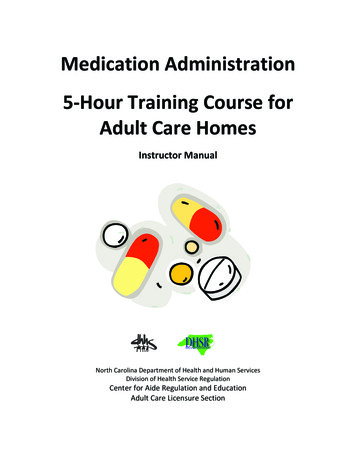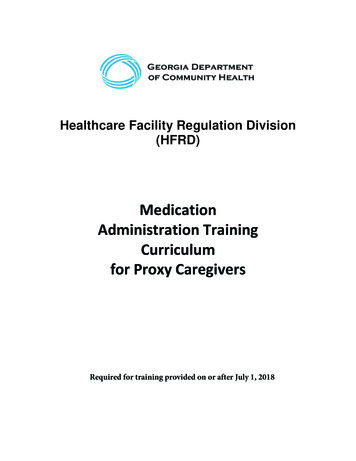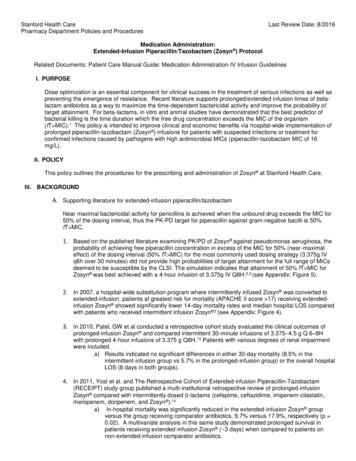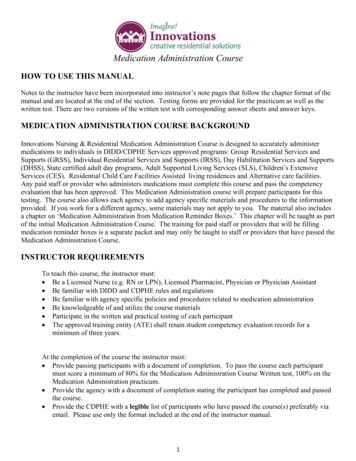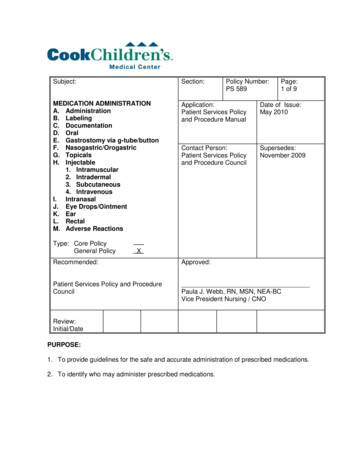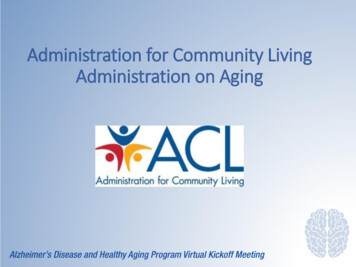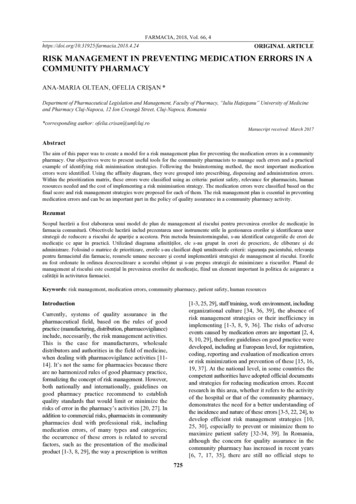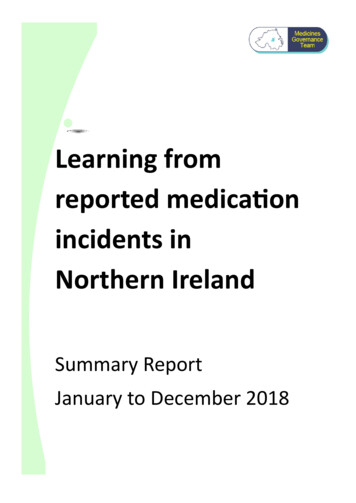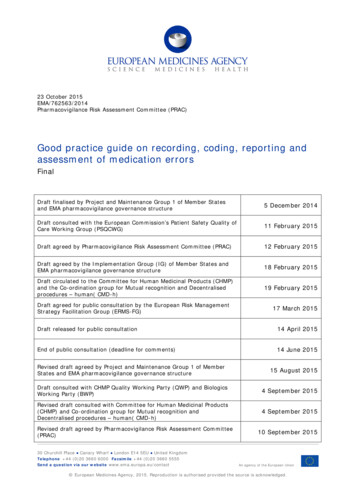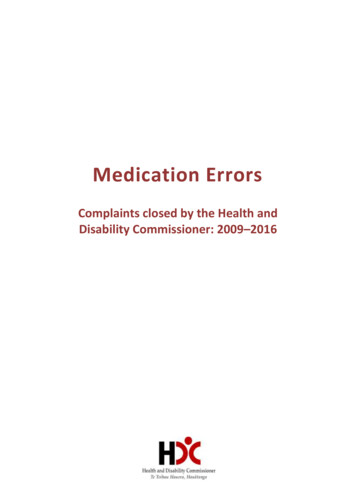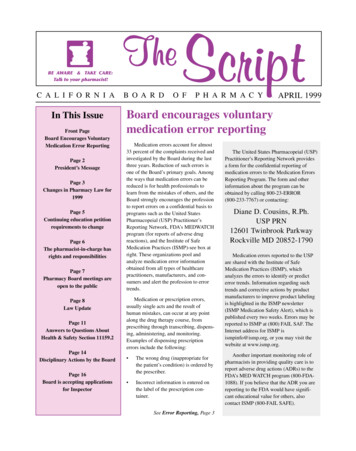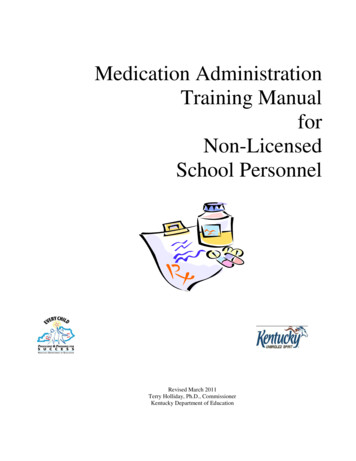
Transcription
Medication AdministrationTraining ManualforNon-LicensedSchool PersonnelRevised March 2011Terry Holliday, Ph.D., CommissionerKentucky Department of Education
Contact:Kentucky Department of EducationDivision of District Support15th Floor Capital Plaza Tower500 Mero StreetFrankfort, KY 40601(502) 564-52792
Table of ContentsACKNOWLEDGEMENT7FOREWARD8COURSE OVERVIEW9Module I: Legal Issues, Policies and Procedures12Module I: Legal Issues, Policies and Procedures13Introduction13Laws Related To Medication Administration13Role of Unlicensed Personnel in Medication Administration16Confidentiality and Privacy16Other Legal Considerations in Medication Administration17B. Storage and Disposal of Medications19C. Field Trips and Medication Administration20D. Refusal of Medications20E. Medication Errors21Preventing and Reporting Medication Errors21Module II: Classification of Medications, Medications Preparation, Administration, andDocumentation24Module II: Classification of Medications, Medications Preparation, Administration, andDocumentation25Prescribed Medications25A. Controlled/scheduled medications25B. Non-controlled/scheduled medications25Over the Counter (OTC) Medications25Medication Classifications25Common Medications26(Please note that this is not an all inclusive list.)26Understanding Effects of Medications/Adverse Drug Effects28Various Forms of Medication Administration29A. Oral (by mouth)29B. Topical29C. Inhalers and Nebulizers303
D. Emergency Medications30Handling Medication31A. Hand Washing31B. How to Avoid Touching the Medication31C. Cutting or Crushing Tablets31D. Measuring Liquid Medication31Ensuring Accurate Administration of Medication32To safely manage and administer medications to students, the ―six rights of medication administration‖ mustbe followed. (See Handouts section for the Six Rights )32Procedure for Administering Medications33Medication Errors33Refusal of Medications33Medication Documentation (Medication Log/Medication Administration Record)33Module III: Emergency Medication Administration35Module III: Emergency Medication Administration36Emergency Medications36A. Glucagon for Hypoglycemia36How to Administer Glucagon 38B. Epinephrine for Anaphylaxis39How to Administer an EpiPen 40C. Diastat Rectal Gel for Seizures41Note: Additional product information: http://www.Diastat .com/3-Prescription/2-Dial Lock.htmlHow to Administer Diastat AcuDial (Diazepam rectal gel)4243Module IV: Local School District46Policies and Procedures46Module IV: Local School District Policies and Procedures47Medication Administration47Handouts48Common Medication Abbreviations49Glossary of Medical Terms50HANDOUT #153STEPS FOR PROPER HAND WASHING53Proper hand washing is essential in preventing the spread of germs.53Always wash your hands before preparing to administer medications.534
Alcohol Based Hand Sanitizers53Using an Alcohol Based Hand Sanitizer53HANDOUT #254Six Rights of Medication Administration54Always Check the Medication:54Handout # 355Any Public SchoolMedication Administration Record55Any Public School55Medication Administration Record56Modified from Southgate Independent School District, KDE 201056Handout # 457Brand and Generic Names for Common Medications57Handout # 558Oral Medication Administration58Handout # 659Liquid Medication Administration59Handout # 760Eye Drops or Ointment60Handout # 861Ear Drops61Handout # 962Topical Ointment or Creams62Handout # 1063Nasal Spray63Handout # 1264Metered Dose Inhalers (MDI)64HFA (hydrofluoroalkane) Inhalers64Additional Product Information for Inhalers64Appendix655
Course Objectives68Module I: Legal Issues, Policies and Procedures69A.71B.71Module II: Classification of Medications, Medication Preparation, Administration, and Documentation72Module III: Emergency Medication Administration75Module IV: Local School District Policies and Procedures786
ACKNOWLEDGEMENTThe Kentucky Department of Education (KDE) recognizes the need for a uniform medicationadministration training program for unlicensed school personnel. This course was developedcollaboratively between the KDE, the Kentucky Department for Public Health (KDPH) and inconsultation with the Kentucky Board of Nursing (KBN) to ensure compliance with 201 KAR20:400, KRS 156.502, and 704 KAR 4:020.7
FOREWARDThe KDE and the Kentucky Board of Education (KBE) recognize the need for a standardizedmedication administration training program for unlicensed school personnel that will ensure studentsafety. Clarification of what may be safely delegated per KRS 156.502, as well as anunderstanding of procedures related to medication administration by unlicensed personnel isneeded because licensed professional may not be physically present in the school building at alltimes.A standardized training curriculum for medication administration by unlicensed school personnelwas developed by the KDE in collaboration with the KDPH and the KBN. The curriculum has beenreviewed and approved by KBN, verifying compliance with 201 KAR 20:400. This curriculum is theofficial training program for all unlicensed Kentucky public school personnel who accept delegationto perform medication administration.All curriculum revisions shall be made by KDE when Kentucky Revised Statutes or KentuckyAdministrative Regulations indicate revisions are needed.8
COURSE OVERVIEW9
Course OverviewCourse ObjectivesUpon completion of this course, unlicensed school personnel will be able to:understand how medication administration may be safely delegatedidentify the responsibilities of the school nurse and unlicensed school personnel inmedication administrationunderstand local school board policies for medication administrationrecognize and apply the six (6) rights of medication administrationidentify proper storage of prescription and over-the-counter medicationunderstand appropriate and correct documentation of medication administrationunderstand proper action and documentation necessary for refusal and omission ofscheduled medicationsunderstand prevention of medication errors and incident reportingrecognize when it is appropriate to contact additional resources (nurses, physicians,poison control and emergency medical services)Course GoalsThis course is intended for non-licensed personnel who have accepted the delegation to providemedication administration to students in a school setting. According to 704 KAR 4:020, Section4(3)(g), beginning with the 2010-2011 school year, proof that all unlicensed school personnel whohave accepted delegation to perform medication administration in school have completed atraining course provided by the KDE. This course shall be developed in consultation with the KBNto ensure compliance with 201 KAR 20:400. As per KRS 156.502, the delegation is only valid forthe current school year. It is understood the employing school will reserve the right to recommendindividuals for this training. Upon successful completion of this course the non-licensed schoolemployee will demonstrate competency, as determined by the delegating Registered Nurse (RN),Advanced Practice Registered Nurse (APRN), or physician, in:administration of student medicationverification of student instruction on self-administration of medicationsadministration of emergency medications for students with diabetes, allergic anaphylacticreactions and seizures10
Course DescriptionThis course is designed to include four modules:Module I: Introduction, Legal Issues, Policies and ProceduresModule II: Classification of Medications, Medication Preparation, Administration, Storageand DocumentationModule III: Administration of Emergency MedicationsModule IV: Local School Board Policies & ProceduresMedication Administration Open Book Exam and Demonstration of Skill CompetencyA study guide has also been developed to assist with this training material. Personnel will beexpected to score a 100% on the skill competency evaluation and 85% on an open book finalexam which will include demonstration of:1. reviewing student medication history on Medication Administration Record/Medication logfor documentation of allergies and other co-existing medical condition2. using proper hygiene/universal precautions in medication preparation3. accurately identify student/client medication information by comparing medication label tothe transcribed Medication Administration Record/Log4. application of:a. eye ointment/dropsb. ear dropsc. topical ointments/creams5. administration of oral medications6. correct use of oral/nasal inhalers7. use of emergency medications: EpiPen , Diastat and Glucagon 8.an understanding of local school district policies and proceduresA score of 85% must be achieved on the open book exam and a score of 100% on the skillcompetency evaluation to pass the course. School personnel may repeat either the failed exam orskill competency evaluation one time. If school personnel fail the final open book exam or the skillcompetency evaluation twice, they must repeat the training course.Personnel who are trained and delegated to perform medication administration only of EpiPen ,Diastat and/or Glucagon will be expected to score 100% on the final skill competencyevaluation and 85% on the open book final exam for administering these emergency medications.11
Module I: Legal Issues, Policies andProcedures12
Module I: Legal Issues, Policies and ProceduresIntroductionMany children with chronic health conditions or illnesses attend Kentucky’s public schools and mayrequire medication that would affect attendance or program participation. While many schools mayhave a licensed nurse available, there are also schools where students do not have access to alicensed nurse to receive their medication. Due to the increasing number of students who requiremedication during the school day, whether in the classroom or on a field trip, school nursessometimes need to delegate the administration of student medications.There is much more to administering medications than just handing a student a pill and keepingthe medicine bottle in a drawer. This curriculum was developed to give school personnel moreinformation about:current Kentucky lawsschool district policies and procedures regarding delegation of medication administrationprocess of administering medicationcorrect and appropriate documentationwhen to seek additional assistance from resources such as a nurse, poison control oremergency medical servicesThe curriculum was developed collaboratively with the KDE, the KDPH and the KBN.Laws Related To Medication AdministrationThe number of students with complex health issues attending school is increasing. Of the studentswho may require medication during the school day, some require prescribed medications at ascheduled time daily. Others may require over-the-counter medication episodically, such as to treata headache. Some students may have a chronic health condition that requires an emergencytreatment to reduce the threat of a potential life-threatening event.The potential for unsafe administration of medication in all these scenarios poses a possibleliability for schools. An understanding of state laws and school district policies and procedures isnecessary to reduce the potential liability issues of medication administration in the school setting.School personnel who accept the delegation of medication administration and successfullycomplete this course, including demonstrated competency, are protected from liability under KRS156.502. (See Appendix)Only Physicians, Dentists and Advanced Practice Registered Nurses (APRN) are licensed to―prescribe‖ medication. Nurses are licensed to ―administer‖ medications (KRS 314.011). Onlyregistered nurses, APRNs or physicians in the school setting may delegate the task to administermedications to persons who have completed a course such as this, and have demonstratedcompetency (KRS 156.502). School personnel may be trained to administer emergency drugs thatinclude Diastat , Glucagon , and Epipen . (KRS 158.838, KBN AOS #15).13
In Kentucky, a school nurse may be either an Advanced Practice Registered Nurse (APRN), aregistered nurse (RN) or licensed practical nurse (LPN). There is a difference in the educationalpreparation and scope of practice between the APRN, RN and LPN. The scope of practice for theAPRN, RN, and LPN are defined in KRS 314.011 and described below in KBN AOS #30, ―SchoolNursing Practice‖.I.Advanced Practice Registered NursingIt is within the scope of the advanced practice registered nurse (APRN), designated nursepractitioner or clinical nurse specialist, to provide primary healthcare services to students inaccordance with 201 KAR 20:057, Scope and standards of practice of APRNs. The APRNmay also perform acts within the scope of registered nursing practice.II.Registered Nursing PracticeIt is within the scope of registered nursing practice for a registered nurse, qualified byeducation, experience, and current clinical competence to provide school healthservices/acts including but not limited to the following:a. utilize substantial, specialized nursing knowledge, judgment and skill in providingprimary healthcare to students including ". initial assessment, management ofminor illness and/or referral to other health professionals, monitoring of chronicdiseases, health supervision, counseling, promotion of healthy life-styles, diseaseprevention, and the coordination of services when specialized care is required."(National Association of School Nurses, Resolution--Primary Health Care, June1981.)b. serve as a health advocate of students, and a consultant to educational staffc. serve in family resource and youth services centers as defined in KRS 156.497d. provide health teaching with a focus on disease prevention, health promotion andhealth restoratione. monitor the quality of the healthcare services provided for studentsf. provide direct clinical services for students with special needs and/or teach andverify competency, supervise and delegate [as defined in KRS 314.011(2)] theperformance of select acts to unlicensed school personnel in accordance with theadministrative regulation 201 KAR 20:400 governing delegation of nursing tasks tounlicensed personsg. participate in the development of policies and procedures to guide nursing practicein school settings, and to address expanding school health services to students,families and communitiesh. delegate select health services to a school employee in accordance with KRS156.502 and 201 KAR 20:400III.Licensed Practical Nursing PracticeKRS 314.011(10) defines licensed practical nursing practice. By definition, licensedpractical nurses practice under the direction of a registered nurse, physician, or dentist andare not licensed for independent nursing practice. The board recognizes the participation ofthe licensed practical nurse in school nursing practice when the LPN is qualified byeducation, experience and current clinical competency and practices under the directionand delegation of a designated registered nurse, physician, or when applicable, a dentist.The licensed practical nurse performs acts within the scope of licensed practical nursingpractice as defined in KRS 314.011 (10); however, under KRS 156.502 (2) the LPN does14
not delegate the performance of health services to school employees.The RNs may administer medications and treatments as prescribed by physicians, physicianassistants, dentists and advanced practice registered nurses (APRNs). Supervision of the LPNdoes not require the supervisor to be physically present in the same building. However, the LPNmay not practice without oversight of the nursing care provided to students.While there are similarities in the Registered Nurse practice and the Licensed Practical Nursepractice, the degree of educational preparation and the responsibilities of each are different. Boththe RN and LPN must hold a current license from the KBN and their licenses must be renewedannually. For licensure renewal each nurse is required to complete KBN approved continuingeducation each year, or provide documentation of a state nursing board approved alternative.These and other laws are in place to govern the practice of nurses in the state of Kentucky and toensure the health and safety of those served.The KBN has the legal authority (KRS 314.021) to regulate nursing practice in order to safeguardthe health and safety of citizens of Kentucky. Delegation is defined by the American Nurses’Association as ―the transfer of responsibility for the performance of an activity from one individualto another, while maintaining the accountability for the outcome.‖ School health services (i.e. suchas the administration of medications) may be delegated to unlicensed school personnel accordingto related sections of KRS 156.502. KRS 156.502 describes who may delegate health service(s)(physician, APRN or RN), the training and documentation of the training. The delegation andtraining is only valid for the current school year. (KRS 156.502 (2)2)For school nurses, Kentucky Administrative Regulation (KAR) 201 KAR 20:400 - Delegation ofnursing tasks to non-licensed personnel, provides direction on how tasks may be delegated to anon-licensed individual by a licensed registered nurse. The delegating school nurse will also beresponsible for ongoing training and competency evaluations of the non-licensed personnel tosafeguard the health and welfare of the students in their care. Supervision is defined in 201 KAR20:400 to mean ―the provision of guidance by a qualified nurse for the accomplishment of a nursingtask with periodic observation and evaluation of the performance of the task.‖ The evaluationshould include validation that the nursing task has been performed according to establishedstandards of practice. Even when school personnel may perform the task, whoever delegates thetask will retain the responsibility for the outcome. Supervision of unlicensed school personnel doesnot require the delegating nurse to be present in the same building. However, the delegatingschool nurse should be available by phone for consultation.Upon successful completion of this course, course exam and skill competency evaluation, the nonlicensed school employee will receive a proof of completion certificate. (This in no way identifies theindividual as a Certified Medication Administration Technician.)15
Role of Unlicensed Personnel in Medication AdministrationKRS 156.502 established the definition of ―health services‖ and the provisions for who may providehealth services in schools. School employees may be delegated selected health servicesaccording to KRS 156.502. (See Appendix)When accepting the delegation to perform medication administration in the school setting, theunlicensed school employee performs this function under the supervision of the delegatinglicensed professional (KRS 156.502). Unlicensed school personnel should only accept adelegation that he/she knows is within his/her skill set or knowledge and should always contact thesupervising school nurse if unclear about administering a medication. Unlicensed personnel havethe responsibility to follow school district policies and procedures and report to the nurse if theyhave any reason to believe they have made a medication error. This should be reported as soonas possible.KRS 156.502 requires written documentation of the school employee’s consent to the delegation ofmedication administration verifying that they have received training and demonstratedcompetency. The delegation, training and documentation are only valid during the current schoolyear.Confidentiality and PrivacyConfidentiality is a very important legal concept in the school setting. The Family EducationalRights and Privacy Act (FERPA) is the federal law that protects the privacy interests of studentsand their educational records. FERPA applies to any educational agency that receives funds fromthe United States Department of Education (USDOE). Health reco
A standardized training curriculum for medication administration by unlicensed school personnel was developed by the KDE in collaboration with the KDPH and the KBN. The curriculum has been reviewed and approved by KBN, verifyi
